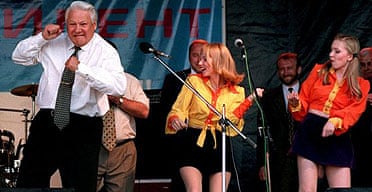Boris Yeltsin may have come across as a buffoonish figure at times, but Russia owes him a considerable debt as he almost single-handedly snuffed out a coup by communist hardliners.
It was August 18 1991, when unreconstructed communists led by Vladimir Kryuchkov tried to seize power, holding Mikhail Gorbachev in Crimea. With a power vacuum in Moscow, Mr Yeltsin raced over to the Russian parliament and faced down the tanks of those who wanted to set back the clock on Russia's nascent democracy.
He made a rousing speech from the turret of a tank and rallied the public against the plotters who subsequently fled Moscow. Mr Gorbachev returned to Moscow and Mr Yeltsin was hailed as the saviour of Russian democracy.
Capitalising on his feat outside parliament, Mr Yeltsin became the first popularly elected president in Russian history, winning 57% of the vote.
That popularity soon dissipated as Mr Yeltsin embarked on "shock therapy" for the Russian economy on the advice of outside experts such as the Harvard economist Jeffrey Sachs. The brutal reforms saw a huge drop in living standards, the rise of the oligarchs who bought state assets at bargain basement prices, and extensive corruption that drew comparisons with robber baron capitalism in the US during the 19th century.
By the time he left office, Mr Yeltsin was a deeply unpopular figure in Russia, with an approval rating as low as 2% by some estimates. His image was not helped by his reputation for the bottle.
During a visit to Germany in 1994 Mr Yeltsin, drunk on champagne, jumped on a stage when the band struck up a Russian folk song at a luncheon. He snatched the baton and conducted the brass band while singing, dancing and blowing kisses to the audience.
A month later, he caused further embarrassment for fellow Russians when he failed to attend a meeting with the then Irish prime minister Albert Reynolds. After a long wait at the end of a red carpet on the runway at Shannon airport, the Irish leadership was informed by the president's advisers that he was "unwell" and would not be leaving the plane. It emerged later that had been drinking.
When he announced that he was giving up the day-to-day running of the country after increasing health problems - he had a quintuple heart bypass following his 1996 re-election - he could not have picked a more different person to succeed him.
The man he chose as prime minister who would later become president was Vladimir Putin, a man no one would call a buffoon.
